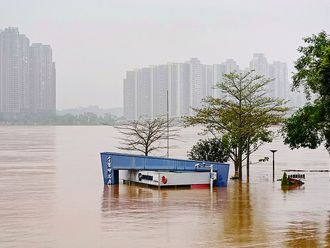A powerful warlord dismissed as governor of Afghanistan's most prosperous province warned yesterday against isolating the heroes of the resistance against Soviet and Taliban rule.
Esmail Khan, whose replacement as governor of Herat by Afghan President Hamid Karzai sparked bloody protests in the western city this month, said mujahideen leaders who fought Moscow's decade-long occupation in the 1980s still had a role to play.
"Some of the commanders have spent their lives fighting," Khan said. "They have skills that can still be used by the government. They should be included more in governing."
Veteran warrior Khan said he saw no role for himself even after Afghan-istan's first-ever direct presidential elections on October 9 unless it was in a military capacity.
Karzai offered Khan the role of Minister of Mines and Industry after removing him as Herat governor, but the commander declined what Kabul said was a promotion because he said he lacked the necessary qualifications.
The situation highlights the problems faced by Karzai as he heads into an election he hopes will legitimise his rule after his appointment as interim president in December 2001 following the overthrow of the Taliban.
Although the presence of nearly 25,000 foreign troops in Afghanistan has improved security and stability, Karzai still relies on the support of regional warlords and commanders to give the central government credibility and to channel revenues.
Khan, who fought against the Soviets and the Taliban, is the highest-profile regional strongman to be tackled by Karzai. The snowy-bearded commander has ruled Herat as a personal fiefdom for years and is credited with turning the city into the most prosperous and well-organised in the country.
"He is a good man at heart, but he is a commander first," said Rafiq Shahir, head of the Herat Professional Shura, a lobby group for more than 2,000 doctors, engineers and other experts. "He has done many things for Herat, but there are some who think his time has passed and it is time for a new way of doing things." Although he has moved from the governor's residence to his well-appointed personal compound, Khan still spends up to 15 hours a day receiving visitors and petitions from his supporters.
"He may not be governor any more, but he is still in charge," said Moman Abizaid, a former member of Khan's militia, as he waited for an audience to ask for money for his sick son.
The new governor, Herat native and former ambassador to Ukraine Sayed Mohammad Khairkhwa, has pledged to disarm factional fighters.
Khan's influence is everywhere in Herat. In the city centre, the newest monument features giant portraits of Khan, his son, Afghan resistance hero Ahmad Shah Masood and Karzai.
No posters of Karzai appear on the perimeter of Khan's residence, although pictures of the other 17 candidates standing in next month's election are plastered on the walls.
"If people ask me who to vote for, I tell them to carefully think about it and make up their own mind," Khan said.












